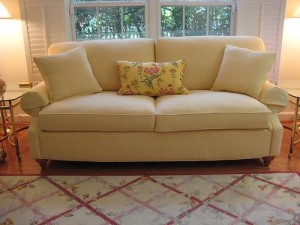Slow Living, Slow Design, Slow Food, Slow Piano
 Today, while perusing the Home section in the Sunday paper, I came across an amusing column by Marni Jameson in which she demanded fast answers to questions on the Slow Movement in design.
Today, while perusing the Home section in the Sunday paper, I came across an amusing column by Marni Jameson in which she demanded fast answers to questions on the Slow Movement in design.
She found that Slow Design means “living more simply, creating systems that reduce clutter in your life, and decorating thoughtfully and with purpose.” Instead of going to the mall and decorating a room in one or two weekends, live with your room and slowly add special items which have special meaning for you. Jameson advises loving your home now rather than waiting until it is “finished” and creating spaces that restore you, ignoring other’s expectations.
When I did a search for Slow Living on ye old interweb (which ironically was blazing fast today), explanations included taking the time to make personal connections, preparing and eating fresh local foods, scheduling family life less to allow more natural exploration and discovery, and pursuing life with an emphasis on quality and detail. Slow Living is definitely anti-fast foods and mass consumption.
Wow, I thought, music study and learning is an absolute natural for Slow Living. I have been a part of the Slow Living Movement for years and didn’t even know it. Music done right fits every single explanation for Slow Living above.
We make personal connections, with pieces, teachers, students, colleagues, families, and listeners. Most of us prepare and partake of local concerts and events—including home concerts. The most successful among us naturally explore and discover music while maintaining an emphasis on quality and detail. We are drawn to play music that restores and helps us keep our balance in a hectic life.
So, what would the Slow Piano part of the Slow Living Movement mean? Slow Piano would be anti Fast Piano. Listening to live performances in addition to YouTube and recorded performances would be a given. The balance would shift away from musical mass consumption. Taking part in local live performances for family, friends, and community would also be a very Slow thing indeed.
Slow Pianists would value quality over quantity and care about craftsmanship no matter what the musical genre. Parents who valued Slow Piano would quit trying to push their students into hard pieces in order to one-up other parents, and care instead about building a solid foundation for a lifetime of Slow Piano.
I wonder what would happen if I listed Slow Piano in my syllabi and discussed it at interviews. Would it be seen as just a gimmick—as spin on something long accepted? Or might others think again about the value of music and music study in their lives? Might they also think twice about what kind of music they are consuming and the balance of music in their lives?
I would love to answer these questions, but I have 3 minutes 30 seconds left to feed the dog, find an appropriate piece for my next student, and move the sofa to the other side of the studio.